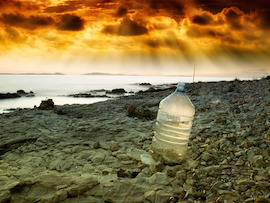While the future is difficult to predict, available freshwater resources will certainly decrease in the coming years due to the increasing demand of a growing world population. Many areas of the world that are already experiencing a shortage of water resources will see their water issues worsen, causing hardships for millions. Here are 18 projections that attempt to predict the future of the world’s water supply.
 By 2020 about 30-40% of the world will have water scarcity, and according to the researchers, climate change can make this even worse.
By 2020 about 30-40% of the world will have water scarcity, and according to the researchers, climate change can make this even worse.
Source
With only 7% of the world’s freshwater, China plans to produce 807 million gallons a day from desalination by 2020, roughly quadruple the country’s current capacity.
Source
By 2025, an estimated 1.8 billion people will live in areas plagued by water scarcity, with two-thirds of the world’s population living in water-stressed regions.
Source
There will be about 1 billion more mouths to feed worldwide by 2025 and global agriculture alone will require another 1 trillion cubic meters of water per year (equal to the annual flow of 20 Niles or 100 Colorado Rivers).
Source
UN studies project that 30 nations will be water scarce in 2025, up from 20 in 1990.
Source
According to the U.S. Intelligence Community Assessment of Global Water Security, by 2030 humanity’s “annual global water requirements” will exceed “current sustainable water supplies” by 40%.
Source
The global middle class will surge from 1.8 to 4.9 billion by 2030, which will result in a significant increase in freshwater consumption.
Source
Water demand in India will reach 1.5 trillion cubic meters in 2030 while India’s current water supply is only 740 billion cubic meters.
Source
If current usage trends don’t change, the world will have only 60 percent of the water it needs in 2030.
Source
By 2035, the world’s energy consumption will increase by 35 percent, which in turn will increase water use by 15 percent according to the International Energy Agency.
Source
By the year 2040 there will not be enough water in the world to quench the thirst of the world population and keep the current energy and power solutions going if we continue doing what we are doing today.
Source
The number of people living in river basins under severe water stress is projected to reach 3.9 billion by 2050, totaling over 40% of the world’s population.
Source
Compared to today, five times as much land is likely to be under “extreme drought” by 2050.
Source
Feeding 9 billion people by 2050, will require a 60 percent increase in agricultural production and a 15 percent increase in water withdrawals.
Source
Water demand is projected to grow by 55 percent by 2050 (including a 400-percent rise in manufacturing water demand).
Source
By 2050, 1 in 5 developing countries will face water shortages (UN’s Food and Agriculture Organization).
Source
Between 2050 and 2100, there is an 85 percent chance of a drought in the Central Plains and Southwestern United States lasting 35 years or more.
Source
If farmers in Kansas keep irrigating at present rates, 69 percent of the Ogallala Aquifer will be gone in 50 years.
Source
